England v Tunisia: The story of the trouble at France 98
- Published
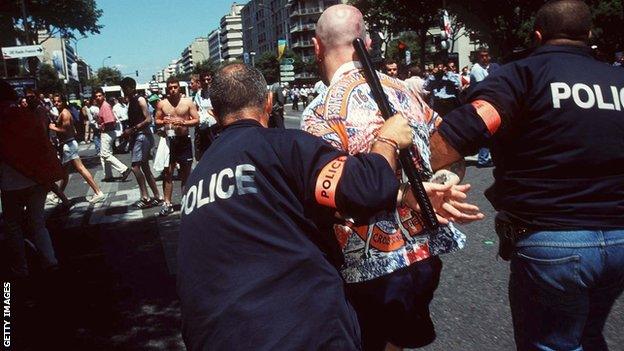
Marseille city authorities said 63 people were injured in the three days of fighting in June 1998
Tunisia v England |
|---|
Date: Monday 18 June (19:00 BST) Venue: Volgograd Arena, Volgograd |
Coverage: Watch the game live on BBC One, the BBC Sport website and app. Listen live on 5 live. with live text commentary online |
Prime minister Tony Blair called it "a total disgrace", the head of the Football Association said he was "sickened", and the sports minister said, external a "moronic minority" were ruining England's reputation abroad.
At least 32 people were injured during three days of rioting and violence when England met Tunisia in Marseille in their opening game of the World Cup in France in 1998.
Much has changed on and off the pitch in the 20 years since, but England will again play Tunisia in their first match of a major tournament when the sides meet in Volgograd on Monday.
So what happened in Marseille? And why?
Marseille 'a recipe for disaster'
After the World Cup qualifying failure of 1993, the game with Tunisia in Marseille was England's first in the tournament since their excruciating defeat to West Germany in Turin eight years earlier.
Expectations were high, and even manager Glenn Hoddle's decision to leave Paul Gascoigne at home did not deter thousands of fans from making the journey across the Channel.
But not everyone was happy with the decision to play the opening game at the Stade Velodrome. Sir Brian Hayes - former deputy commissioner of the Metropolitan Police - was recruited by the FA as a security advisor for the tournament and says they wanted the game moved.
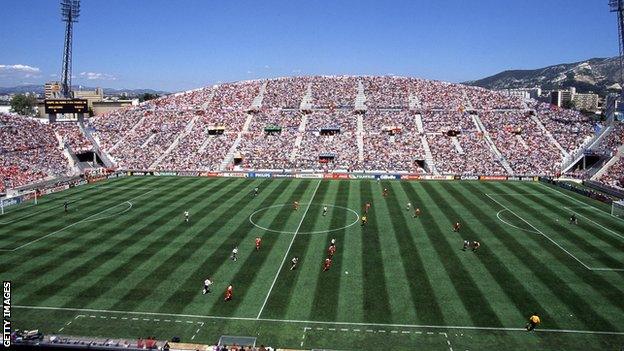
The FA's security advisor wanted the game moved from Marseille
"In the build up to the World Cup we tried to get the game switched to a different venue," Hayes told BBC Sport.
"I fought personally quite hard, and the chief executive of the FA tried because of the large resident north African population in Marseille. It was going to be staged in very hot weather, there was obviously going to be a lot of drinking by the British fans and the whole climate was wrong, the venue was wrong.
"We tried to get them to switch the matches around so that the Tunisia game could be played in Lens, for example, but they couldn't or wouldn't bow to that at all.
"The recipe was there, from a security point of view, for a disaster. And that's what we got."
'Tear gas in the air' - the build-up
England fans had to wait five days after the start of the tournament to see their side in action, the Tunisia game scheduled for a Monday lunchtime kick-off. As millions back home booked time off work to watch, thousands poured into the Mediterranean port over the weekend.
After some isolated trouble on the Saturday night, Sunday saw 400 England followers involved in pitched battles with Tunisian fans, local youths and police during seven hours of violence which left at least 32 people injured., external
Police fired tear gas to break up groups of several hundred England and Tunisia supporters, there was a constant hail of bottles and missiles and as fans retreated they destroyed shops and premises., external
Two Britons required operations for serious injuries, one for a slashed throat and the other for a knife wound to the stomach. There were nearly 50 arrests. Hayes' prophecy had come to pass.
England fan Tim Rolls: "We realised Marseille could be a flashpoint and best avoided in terms of staying there.
"Our mood the night before the game was not helped by images on French TV of England supporters fighting with police and locals in Marseille and, worse, setting fire to a Tunisian flag. You didn't need to be a diplomatic genius to realise this was going to crank up the tension a few notches."
BBC commentator Jonathan Pearce: "There was some trepidation about the fans. Bad fighting had broken out in what is always a spiky city on the eve of the game. There was talk that England would be thrown out of the World Cup if there was a repeat.
"I was worried because I had family there who had tickets. I remember the relief when I met them outside the stadium and they were OK."
Hayes: "The English fans didn't start it. Some of the African population started lobbing cans of beer at England fans, and even if England fans don't start a fight they are up for one.
"I had seen occasions where England fans started trouble but in Marseille I can say they didn't - from what I saw. They were heavily provoked. It was not a good experience."
BBC news correspondent Robert Hall: "I remember the Sunday very clearly. We jumped out of the van as we arrived in Marseille and saw the trouble down by the harbour and ran off towards it.
"There was tear gas in the air, it was very hot. There were a lot of young north African guys, locals, who came into town to join in with any trouble.
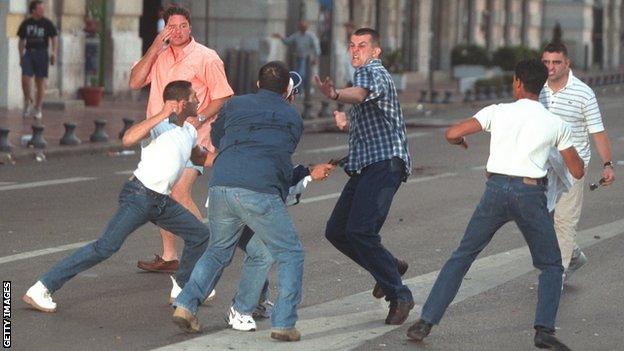
A Tunisian government statement expressed "profound indignation at these unacceptable acts and behaviour which are incompatible with sportsmanship and civilised values".
"It was full on. French police in full riot gear with tear gas charging the fans. I'm always careful to use the word fans as it was the usual hardcore group of people you always find in any sort of trouble like that. We stayed at a reasonably safe distance."
England fan Matt Stewart: "We were aware that there could be trouble due to the reputation of England fans at the time, so we decided to stay in Avignon.
"The night before the game there were hundreds of fans in Avignon but the atmosphere was good. Around 11pm a huge football match broke out in the main square. It was about 80 a side! There were locals and England fans on both sides."
The UK's home secretary of the time, Jack Straw, backed the actions of the French police, saying there were no excuses for hooliganism.
"I don't want to hear any kind of examination of whether these people had bad childhoods," he said at the time.
"I've seen football hooligans myself. They always have a huge amount of money, get completely drunk and then commit this kind of act and then offer excuses.
"We have to try to get a grip of it."
Prime Minister Blair said the fighting, external was a "total disgrace". He added: "It may be a small number of fans, there may be other fans that have been involved, but that is no excuse, there aren't any excuses for it. We have to put a stop to it.
"These people have the absolute condemnation of everyone in the country."
'An air of bristling tension' - game day
As the tear gas cleared overnight in Marseille city centre, it was time for action on the pitch as Hoddle's England lined up against Tunisia live on BBC One.
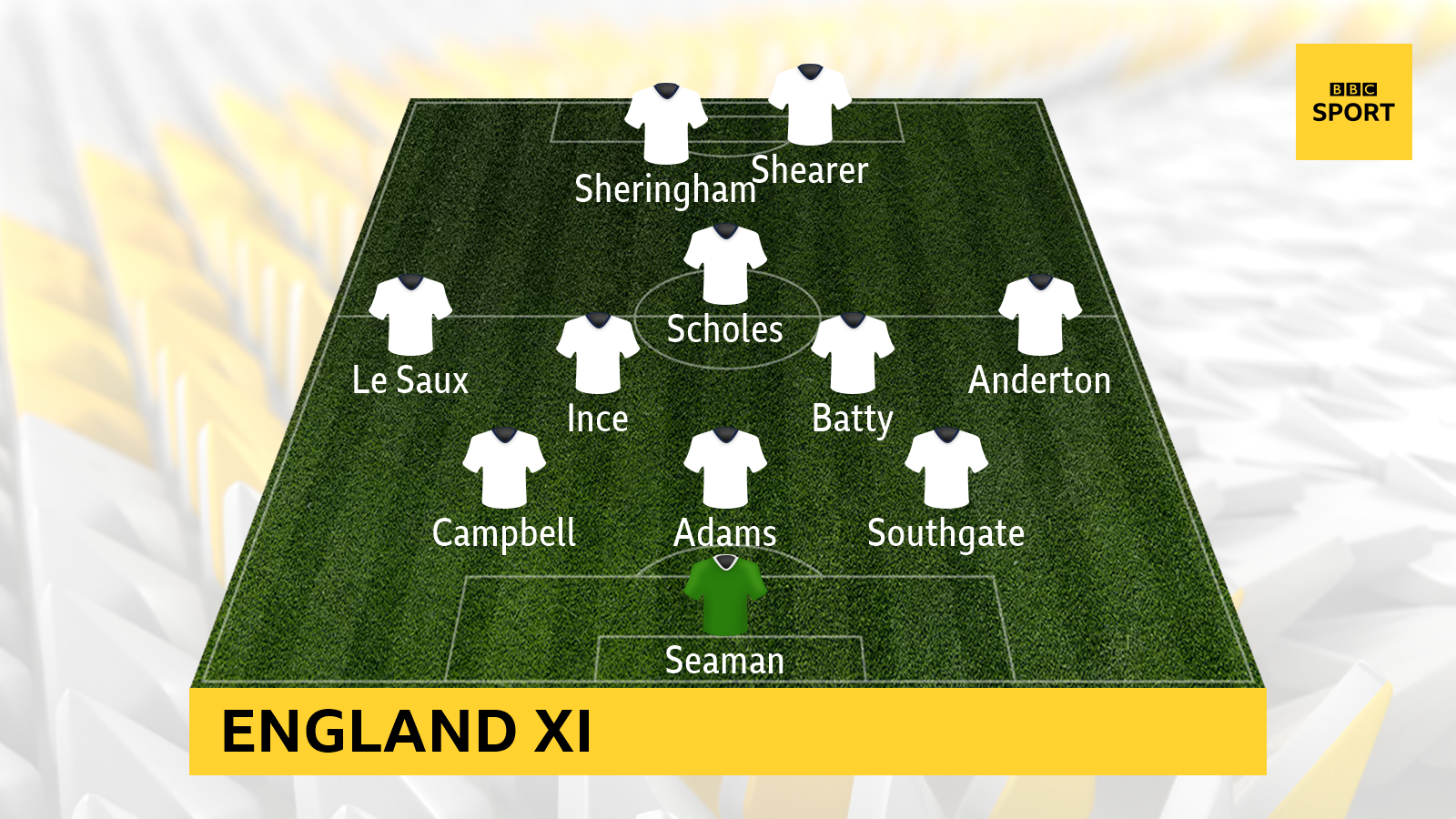
How England lined up for the match at the Stade Velodrome, which they won 2-0
Thankfully - unlike during the England v Russia game in 2016 - there was no trouble inside the Velodrome itself, but scuffles were ignited down on the beach fanzone following Alan Shearer's opening goal in a relatively comfortable 2-0 win.
During the BBC coverage of the game, FA chief executive Graham Kelly hit out at the "400 drunken English people who have come here and caused immense inconvenience and distress".
"We have made progress but as long as people are allowed to leave the country and have the inclination to sit in bars and drink for 24 hours - there is something in the mentality of the English that they are going to cause trouble," he said.
"Their behaviour sickened everyone connected with the England team and all the genuine supporters. It really is terrible. They are not fit to be allowed here. It was frightening, to be honest with you. The only silver lining is that it showed this must be nipped in the bud."
At the time, Kevin Miles of the Football Supporters' Association said England fans were caught up in tension, external between locals and French riot police.
"What happened was a war on the streets of Marseille between the local Arab population and the police for their own reasons about French politics, not English football," he said.
"English fans have been caught in the middle of that with no protection from the police."
Shearer remembers beating Tunisia in '98
The Ref Online reporter Alex Griffiths: "Knowing demand would exceed supply, it was agreed to stage a proto-fanzone before fanzones were yet really a thing, and this was where most of the innocent day-trippers were hurt as they made their way to and from the screening of the game in the unfamiliar sunshine. The violence in the city itself was far more of a consensual affair on the Monday, and if you were able to persuade a hotel to take you in, that was the safest place to sit it out.
"The scene at the port's front became more akin to a film set, with TV lighting paraphernalia up in one corner and extras virtually bussed in direct from Luton, in the days when budget airlines were also a relatively new phenomenon."
Hayes: "That was another thing we advised against - having a big screen on the beach. It was relatively peaceful until England scored and then it kicked off again. England fans were being provoked all the time."
Pearce: "There certainly was an air of bristling tension hanging over the city. My family came in by train and were quite frightened by all the reports. There had been bad clashes in the build up to the game. Marseille could then be, as it is now, quite intimidating.
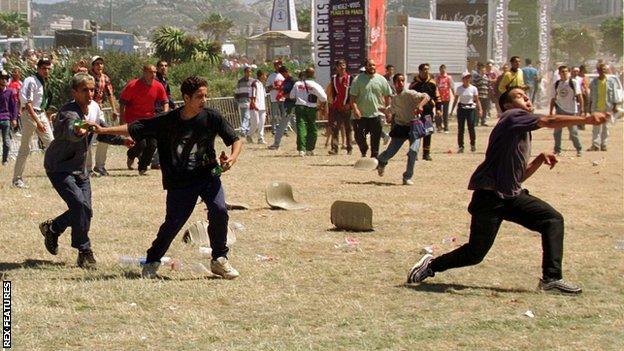
Home secretary Jack Straw told the House of Commons: "The country has been betrayed by fans' treacherous behaviour"
"I remember seeing groups hanging around on street corners waiting for something to happen. But inside the ground it was fine.
"The interesting conflict was between England's genuine belief, and mine, that they could win the World Cup against the real fear that they could get thrown out of the competition for crowd trouble.
"The Stade Velodrome is different these days. Then it had a huge bank behind the right-hand goal. The England fans had turned the whole place into Wembley. There were flags and banners everywhere. No trouble inside the ground. Just a wonderful atmosphere. 60,000 fans. It still makes me tingle to think about it."

Goals from Alan Shearer and Paul Scholes were enough to secure a win in Marseille
England fan Martin Cloake: "I remember being amazed at the sheer numbers who'd travelled - about 40,000 England fans in a 60,000 stadium. We met some really good people, and fans were obviously aware there had been problems, but most of the people we spoke to were fairly determined to keep out of it.
"We could see tear gas and some running about in the streets outside while we were still in the stadium, so obviously we knew there were still problems, but we didn't know the extent of what had happened on the beach until later.
"Most of the conversations we had were with fans who were annoyed that some fans had obviously been involved in trouble and that this would take the focus away from the great support we had. The point is that plenty of fans managed to stay out of trouble, despite the very real issues there were."
Stewart: "We saw the news reports of overnight violence in Marseille when we woke up on match day so were apprehensive when getting the train to the game. On arrival we saw lots of English supporters with cuts, bruises and bandages. Most victims reported they were attacked by locals on mopeds.
"Post-match we saw some running brawls as we headed to the metro. We got to the station to return to Avignon and a large number of English fans were there trying to leave Marseille. Some on our train stated they had nowhere to stay but a park bench was better than risking further attacks in Marseille."
England fan Jeremy Lockley: "We were staying in an apartment about an hour from Marseille. We had heard about the trouble and a few of us considered not going to the game.
"On the morning of the game we decided quite late that we would go, but that we would travel in by car. As we tried to enter the ground we were refused as it was after kick off but eventually we were let in by two policeman who agreed with our point it was better for us to be in the ground than out.
"We ended up in the Tunisia end but inside the ground there was no trouble at all, the Tunisia fans were very friendly and the atmosphere was very relaxed. We celebrated the Paul Scholes goal forgetting where we were and, although we had some funny looks, there was no trouble."
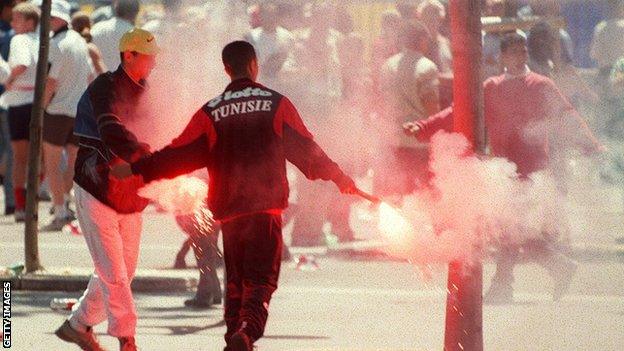
More than 1,000 England fans were banned from travelling to the next World Cup in Japan and South Korea in 2002
'It was a watershed moment' - the aftermath
England's second group game against Romania in Toulouse was also marred by trouble - one fan was stabbed, external - but not on the scale of Marseille.
In the 20 years since then, England fans have been caught up in trouble again - but Hayes believes the Tunisia game was a turning point in how travelling fans are policed.
Hayes: "As a result of what happened in France there was a lot of work between the FA, the police and the Home Office to strengthen the legislation and that's where banning orders came in., external
"In the years that followed, measures were put in which pretty much knocked it on the head. Identifying the troublemakers beforehand, stopping them becoming members of the FA travel club, getting passports withdrawn on occasion - strong measures.
"We have only seen sporadic incidents since, nothing to equal what was going on in the 1990s. It was a watershed in a way, that game. It disappointed us but it led on to strong measures being taken. There was a feeling that enough is enough."
Griffiths: "The daily French paper which invented the European Cup were kind enough to supply me with passes, a car, a list of hotels and 24,000km worth of petrol in return for a month's reportage, and were unkind enough to call it 'Diary of a Hooligan', because clickbait, even then, was kind of a thing."
Twenty years on the sides meet again in Russia. Can England manage better than their second-round exit to Argentina that followed the sides' game in France?
Pearce: "We stayed on the air for a post match phone-in and the fans were genuinely optimistic that England could win the World Cup. This wasn't the usual hype. The hope seemed real.
"I had commentated on all but two England games from 1987 up to that summer of 1998. But my optimism about their chances has never been as high again as it was on that June day in Marseille."